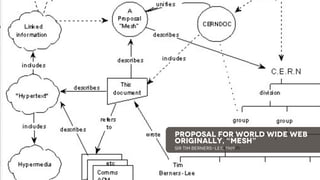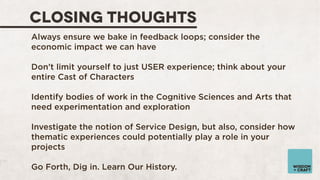A (Brief) History of User Experience
- 1. A (BRIEF) HISTORY OF USER EXPERIENCE @chrispalle @wisdomandcraft #uxhistory 1 wisdom + craft human-Centric research human-Centric wisdom strategy research + craft design strategy design
- 3. DEEP ROOTS IN COMMUNICATION sender MESSAGE receiver feedback wisdom + craft
- 6. DEEP ROOTS IN COMMUNICATION Early Chinese Pictograms Kanji http://en.wikipedia.org/wiki/History_of_writing wisdom + craft
- 7. DEEP ROOTS IN COMMUNICATION Textura (Blackletter), Printed Type (15th Century) Johannes Gutenberg The Printing Press & Moveable Type (Invented in early 1400s) Humanist or Venetian Type (15th Century) wisdom + craft
- 8. GOTHIC ARCHITECTURE Medieval Architecture Renaissance Architecture Laon Cathedral 1160-1225 Ideal Gothic Church The Dome of St Peter's Basilica, Rome wisdom + craft
- 9. Laon Cathedral 1160-1225 The Dome of St Peter's Basilica, Rome Ideal Gothic Church RENAISSANCE ARCHITECTURE wisdom + craft
- 11. The Scientific Method Observation/Experience Define Problem Hypothesis Gather Evidence Retain or Reject Hypothesis Develop Theory 11
- 14. WIRELESS REMOTE CONTROL 14 wisdom + craft
- 15. COMPUTING 1st Tabulating Machine (c. 1885) IBM Type 704 (c. 1957) wisdom + craft
- 16. IMAGING R.B. Thomas - First scanner 1957 http://patapsco.nist.gov/ImageGallery/details.cfm?imageid=342 First Scanned Image 1957 http://patapsco.nist.gov/ImageGallery/details.cfm?imageid=342 wisdom + craft
- 17. CULTURAL PHENOMENON Fashion 1920s Walt Disney 1901-1966 “Hollywoodland” c. 1923 World Travel 1925 wisdom + craft
- 18. NOT THE PRESENTATION LAYER SOCIAL INTERACTIONS BETWEEN PEOPLE AND MACHINE AND BETWEEN OTHER PEOPLE http://wirewax.wordpress.com/2012/03/27/smart-tv-just-got-smarter/ wisdom + craft
- 19. NOT THE PRESENTATION LAYER wisdom + craft
- 20. INFORMATION AGE DAWNS Douglas Englebart First Mouse Inventor 1952 ARPANET, Logical Map March 1977 wisdom + craft
- 21. INFORMATION AGE DAWNS Xerox Star 8010 Document Processor 1981 Originally $17,000 Original Apple “Lisa” 1979-1983 wisdom + craft
- 22. INFORMATION AGE DAWNS wisdom + craft
- 23. Proposal for World Wide Web Originally, “Mesh” Sir Tim Berners-Lee, 1989 wisdom + craft
- 24. INFORMATION AGE RISEN Mosaic, First Web Browser 1993 America Online CDs wisdom + craft
- 25. FROM COMPLEXITY TO SIMPLICITY 25 wisdom + craft
- 26. Claude Shannon “Father of the information age” Boolean Algebra - Digital Logic, AND, OR, & NOT wisdom http://www.youtube.com/watch?v=z2Whj_nL-x8&sns=em + craft
- 27. found through a google image search*. wisdom + craft *URL HERE
- 28. COMPLEXITY EXPLOSION “Internet of Things” - “Big Data” (Too long; didn’t Read) wisdom + craft
- 29. “Internet of Things” - “Big Data” wisdom + craft
- 31. Wa ste Perfection Social Sciences: Economics ce en l el hip xc ftsmans E oor Cra P Efficiency 31 Mathematics: Statistics
- 32. ON VISUAL PERCEPTION Direct Perception What you see is there, not what you perceive to be a state of mind - indirect perception Invariants Fixed objects in space Optic Flow Apparent movement of objects through space Affordances wisdom + craft
- 33. AFFORDANCES Learn more about: J.J. Gibson and Donald Norman wisdom + craft
- 34. HICK-HYMAN LAW Time to make a decision increases with complexity wisdom + craft
- 35. What the??? FITTS’LAW Time required to move to target is a function of its size and distance. wisdom + craft
- 36. Richard Saul Wurman 36 Don Norman Jakob Neilson
- 37. Peter Morville & Lou Rosefeld, Information Architecture for the Web 37 Steve Krug, Don’t Make Me Think Christina Wodtke, IA, Blueprints for the Web & BoxesandArrows.com
- 38. THE BUSINESS OF EXPERIENCE Differentiated Guide Transformation Relevant to Stage Experiences Competitive Position Needs of Customers Deliver Services MAKE GOODS UnDifferentiated Extract Commodities Market 38 Irrelevant to Pricing Premium Pine, B. Joseph., and James H. Gilmore. The Experience Economy. Boston, MA: Harvard Business Review, 1999. 22. Print.
- 39. EXPERIENCE REALMS ABSORPTION ENTERTAINMENT EDUCATIONAL PASSIVE PARTICIPATION ACTIVE PARTICIPATION ESTHETIC ESCAPIST IMMERSION You’re not really “creating experiences” unless you’re hitting all these high notes. The experience must have a participatory aspect to its theme to the point where the persons’ life is so immersed for a period of time that their perception has shifted to believe that their experience is entirely based on their own active participation. Pine, B. Joseph., and James H. Gilmore. The Experience Economy. Boston, MA: Harvard Business Review, 1999. 30. Print. wisdom + craft
- 40. CLOSING THOUGHTS Always ensure we bake in feedback loops; consider the economic impact we can have Don’t limit yourself to just USER experience; think about your entire Cast of Characters Identify bodies of work in the Cognitive Sciences and Arts that need experimentation and exploration Investigate the notion of Service Design, but also, consider how thematic experiences could potentially play a role in your projects Go Forth, Dig in. Learn Our History. wisdom + craft









































